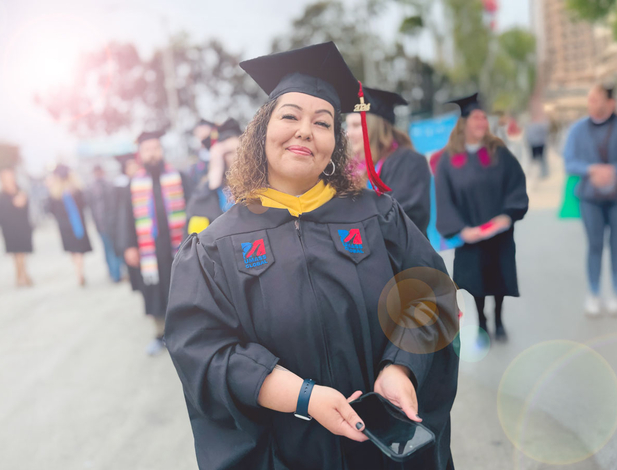University of Massachusetts Global offers 14 bachelor’s degree core areas, such as business, information technology, psychology, legal studies, and criminal justice. Within those areas, we give you 33 concentrations to develop a focused, valuable skill set.

Invest in a Degree... Invest in Your Future.
Earning a bachelor’s degree increases your earning potential. According to the National Center for Education Statistics (NCES),
Those with a bachelor's degree average 66% more earnings per week than those with just a high school diploma.. Having a bachelor's degree has become a basic requirement for many desirable jobs and most supervisory positions. It's one investment sure to pay dividends!

Undergraduate Admission
Interested in an associate or bachelor’s degree program? Review the requirements for your specific program, fill out the online admissions application, and request and submit your transcripts.

Undergraduate Financial Aid
Financial aid is available for undergraduates enrolled in degree programs and teacher credential programs in the form of need-based and non-need based grants, loans and outside scholarships.
Frequently Asked Questions
General
A bachelor’s degree typically takes four years to complete. Some schools, like UMass Global, however offer self-paced online bachelor’s degree programs that allow students to control their own timeline, which can possibly reduce this window. Learn more about competency-based learning.
A Bachelor of Arts (BA) degree is typically more flexible and interdisciplinary, encouraging a broad, well-rounded education with a focus on humanities, such as literature, languages, philosophy, and social sciences. At UMass Global, we offer 20 Bachelor of Arts degrees in our school of Arts & Sciences. Beyond the specific curriculum or major, however, simply attaining a bachelor’s degree of any type has been shown to result in higher lifetime earnings when compared to those having only a high school diploma. See more benefits.
Different countries have varying names for their equivalent education standards that translate to the U.S. bachelor’s degree, with most requiring about four years of study. Many professional fields expect candidates to have this foundational level completed, but employers may consider 4-8 years of work experience in a related field equivalent. This is far from guaranteed, however, as many jobs in today's working world simply require the applicant has at least a bachelor's degree to even apply.
School Psychology and Counseling
The UMass Global psychology undergraduate program offers a Bachelor of Arts (BA) degree. A BA in Psychology provides a broad-based education, offering a wider perspective on the field of psychology. At UMass Global, the electives available within the general psychology concentration reflect this versatility, covering diverse topics such as “Issues in Aging,” “Family Systems and Dynamics,” “Child Development,” and “Survey of Forensic Psychology.” This breadth of coursework allows students to explore multiple areas of psychology and apply their knowledge across various fields and careers.
Bachelor of science degrees in psychology typically are more research-oriented, with lab-based courses targeted toward graduate study in psychology.









